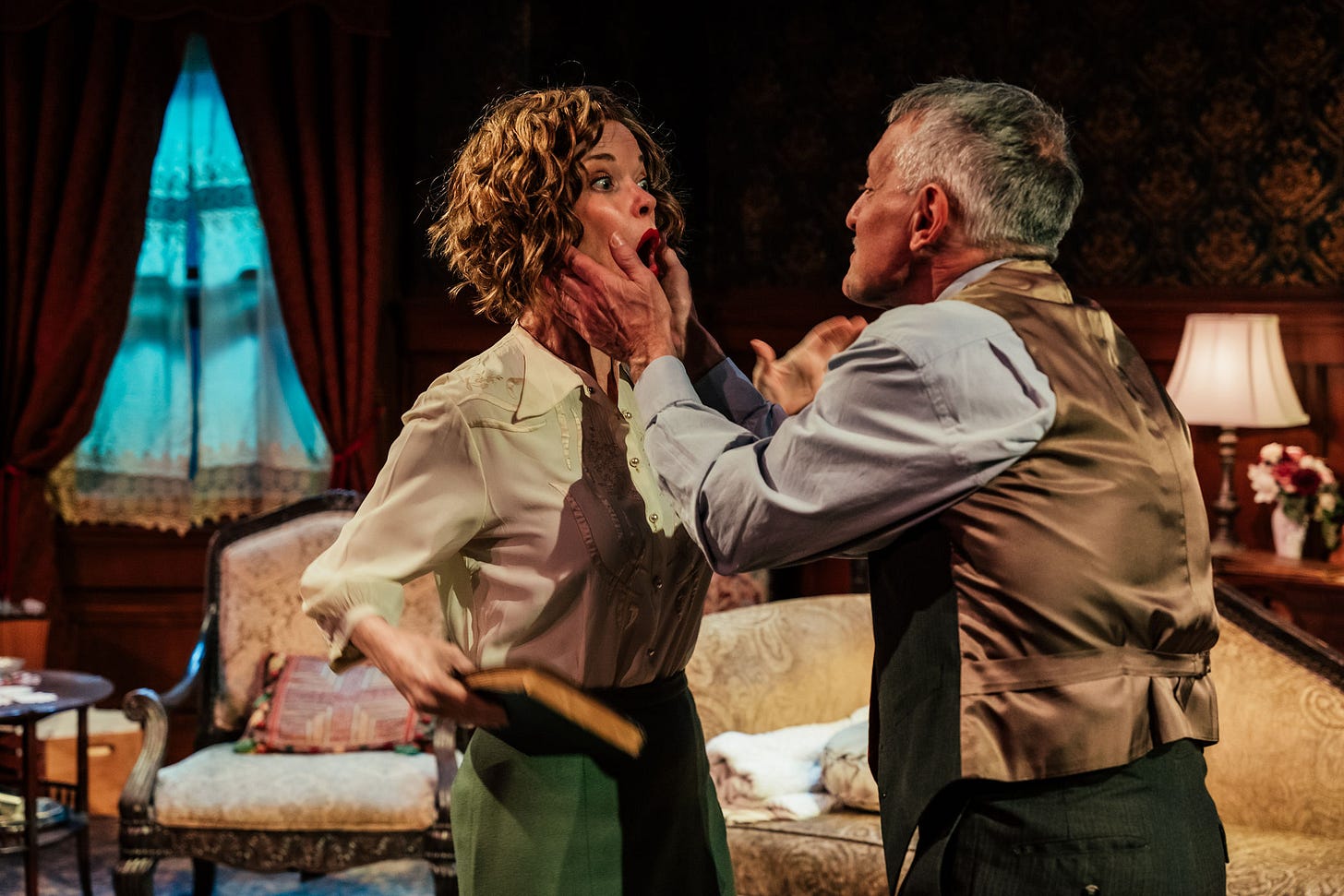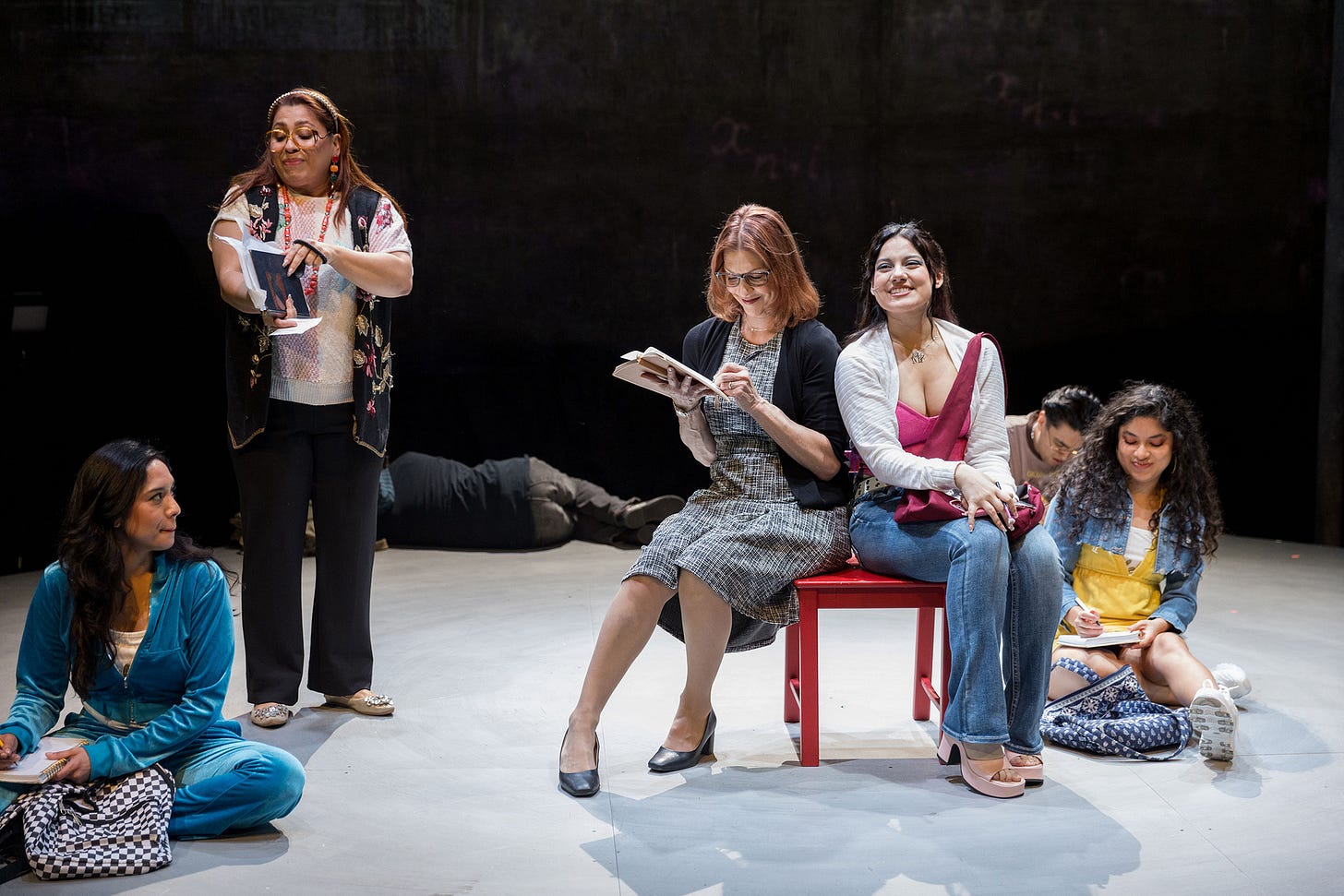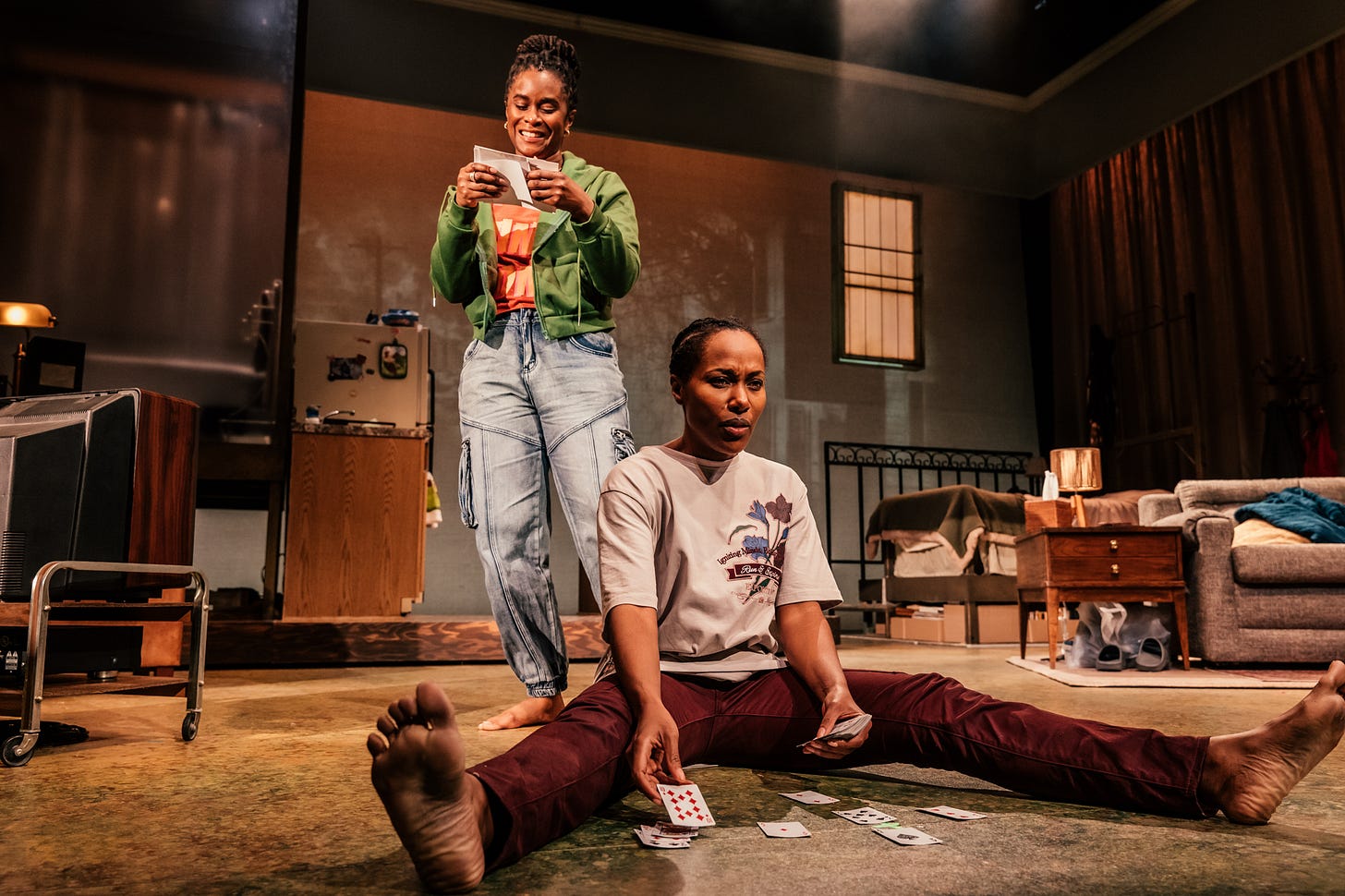Penn plays: pop this 'Cork...', payne's lane
'Corktown '39,' 'Violin Maker,' "Furlough's Paradise,' 'You Are Cordially Invited...', How to Fail,' 'Secret Comedy of Women,' 3 plays at LATC

“I run the country and the world,” Donald Trump proclaimed last week.
How’s that going? Well, 90% of Americans expect his tariffs to raise prices. Trump now says that his 53 previous pledges to end the war in Ukraine within 24 hours were just “a jest.” Disregarding due process, he has begun deporting young American citizens and ignores the Supreme Court’s order to “facilitate” the return of a man who was sent by mistake to a Salvadoran gulag. His bizarre “51st state” goal for Canada helped keep that country’s Liberals in power. Meanwhile, polls indicate that his support is sliding down the drain, but Trump calls pollsters “Negative criminals.”
In the most recent Angeles Stage, which appeared roughly two-thirds through the first 100 days of Trump’s second term, I wrote about the relevance of two productions of “Cabaret” — set in Berlin in the early ‘30s — to our own situation, as Trump’s authoritarian ambitions became increasingly obvious. Now, as Trump’s first 100 days end, I’ll discuss two LA County productions that are set much closer to the horrors that World War II unleashed.
“Corktown ‘39”, a Rogue Machine production at the Matrix Theatre on Melrose, is set — duh — in 1939, on the precipice of Germany’s invasion of Poland. But the setting is surprising. We’re within a group of pro-Irish Republican Army immigrants in what was, back then, the heavily Irish “Corktown” community in western Philadelphia.
John Fazakerley’s play is historical fiction, but it includes some real historical figures and issues. Most pertinently, it highlights how at least some of the more radical elements within the Irish struggle for complete independence from England were willing to ally with Hitler’s Germany in exchange for support for their cause.
One of these extremists, IRA chief of staff Seán Russell (JD Cullum), is visiting Philadelphia’s local Clan na Gael support group, initially with the goal of organizing a plot to assassinate English King George VI when the monarch visits DC. As you probably already know, the assassination never happened. But Fazakerley weaves a fascinating yarn of what might have transpired behind the scenes — including a sizzling romance between the fund-raising daughter (Ann Noble) of a Clan activist (Ron Bottitta) and the young marksman (Jeff Lorch) who has been recruited to do the deadly deed — but who then develops doubts.
Steven Robman’s riveting staging of “Corktown ‘39” for Rogue Machine creates, well, a corker (as in “an excellent or astonishing person or thing”). It’s scheduled to play through May 25. The actors (also including Tommy McCabe, Thomas Vincent Kelly and Peter Van Norden) comprise one of the best ensembles seen in LA recently. And the idea of raising the alarm about collaboration with future Führers is an important ingredient of the play’s unexpected relevance. I didn’t see a production of Fazakerley’s “Corktown ‘57” a decade ago at the Odyssey Theatre, but now I regret it.
The second play mentioned above is more of a post-World War II play. In “The Violin Maker,” by Lisa Pearl Rosenbaum and Ronda Spinak, the title refers to the Israeli luthier Amnon Weinstein (Bruce Nozick), who was responsible for saving and restoring the “Violins of Hope,” a group of instruments that survived the Holocaust even if their initial owners did not.
Produced by International City Theatre in the Beverly O’Neill Theater at the Long Beach Convention & Entertainment Center, “The Violin Maker” is not to be confused with the long-touring “Violins of Hope” concert/exhibition series, which uses the actual “violins of hope” (including a 2022 stop in the same building where this play is being performed). That tour is scheduled to return to the area next month, under the auspices of the Philharmonic Society of Orange County.
Unfortunately, the play doesn’t evoke the emotional power of the documentary videos on the same subject that I’ve since seen (here, for example, is a public TV production about the Violins of Hope in Pittsburgh — the city where the antisemitic Tree of Life synagogue attack occurred). Documentaries and televised news features provide close-ups of the actual Violins of Hope, archival shots of performances in the camps, interviews with the Tel Aviv-based Weinstein family that restored the instruments — and the sounds of the actual violins.
In caryn desai’s ICT staging, a lone violinist — Jonathan Rubin — is barely visible, behind the main stage, accompanied by pianist (and music curator) Noreen Green. They produce the sounds that are imitated by the motions of the actors on the stage. No one is credited for video or projections design, which the production appears to lack. The result feels artificial, compared to the above-mentioned videos — and the stage looks somewhat chaotic, perhaps because the six actors other than Nozick cover the 35 supporting roles that are listed in the script.
Another Pennsylvania story
Let’s move west, from Philadelphia to Pittsburgh — which appears the likeliest candidate to be the “U.S. Great Migration city” that is identified in the script and the program as the site of “Furlough’s Paradise,” at the Geffen Playhouse.
The bio for playwright a.k. payne (they/she) in the Geffen program drops additional hints — it identifies Pittsburgh as the site of their “roots” and adds that “They are a proud graduate of Pittsburgh Public Schools; grandchild of the U.S. Great Migration.”
Also according to the bio, payne is “an nb” [as in non-binary] “and genderqueer abolitionist” who has inherited “a great lineage of Black women storytellers” (among them, Ntozake Shange of “For colored girls…” fame receives the most nods in the play). And the bio mentions that payne studied playwriting under Tarell Alvin McCraney at Yale School of Drama — he’s the Geffen artistic director, who picked “Furlough’s Paradise” for its West Coast premiere.
The play depicts two African-American first cousins in their mid-to-late 20s — Mina (Kacie Rogers) and Sade (DeWanda Wise). They have just attended the funeral of Sade’s mother. For the occasion, Sade (pronounced like the singer’s name, not the marquis’s) has received a three-day furlough from her imprisonment for an unspecified felony.
Mina has flown in from her LA-based job with Google to this apartment, which she sometimes rents out when she’s in LA with her white girlfriend. Sade speaks of a girlfriend in prison and their plans to build a “utopia” when they’re released. The two women spend the weekend pondering the divergences of their two roads, their two futures, and what it all means.
If it sounds static, it isn’t. The pair’s shifting thoughts and moods are magnified in movement segments choreographed by Dell Howlett, under the direction of Tinashe Kajese-Bolden.
The conversations between Mina and Sade have an elliptical quality at times. I had to look up a few of the pop-cultural references sprinkled through the script. But I ultimately found the relationship between the two characters quite moving — emotionally as well as choreographically. Rogers and Wise and the design team entrance through much of the play’s 75 minutes.
A ‘cordial’ approach to climate and cancer
If the characters in “Furlough’s Paradise” sometimes imagine a future “paradise,” those in Keiko Green’s “You Are Cordially Invited to the End of the World!” (closing Saturday at South Coast Repertory) foresee the opposite of paradise — a world that is dying, or at least being radically transformed, by climate change. Greg (Joel de la Fuente) decides to fight that change even as he is literally dying from his own pancreatic cancer.
If that sounds depressing, think again. Green and director Zi Alikhan do figurative cartwheels in order to make the title’s invitation feel “cordial,” like a comedy, and they often succeed, abetted by the narration of M (River Gallo), the offspring of Greg and his frantic wife (Alysia Reiner).
Still, as I returned from Costa Mesa, I began to wonder if the play’s parallel forms of death could have been more organically connected. From my limited research, I detect no obvious connection between pancreatic cancer and climate change. If you want to draw a parallel between an individual’s death and the death of a planet, why not make the individual a victim of climate change, such as those who were killed by the recent fires — which experts said were made worse by the heat and winds and storms of the changing planet?
Speaking of winds and storms, the visual and aural elements in “The End of the World!” are especially impressive in the wake of the storm-precipitated collapse of the roof in late January at SCR’s Production Center in Santa Ana.
Comedy tonight
Ron Campbell, one of the Actors’ Gang founders (and a Cirque du Soleil vet), is still a remarkably agile clown, both physically and verbally. In the Gang’s Culver City headquarters through Saturday, he’s playing the teacher of a UCLA extension course called “How to Fail” (and we’re his students). Here is a TV interview of Campbell with the Gang’s artistic director Tim Robbins.
This professor points out that failure is much more interesting than success. So there’s some irony in the fact that Campbell’s nom-worthy solo performance is a big success. It’s so funny and — near the end — so reflective on the subject of aging that it’s hard to believe that it won’t continue in a later, longer run.
“The Secret Comedy of Women,” at the Colony Theatre in Burbank as part of a national tour, consists of two entertaining middle-aged women, Barbara Gehring and Linda Klein, remembering some of their funnier moments from their years as girls and teenagers. They grew up in Manitoba and Colorado but met each other and became friends only as adults.
They read aloud from their own childhood diaries. They use videos, sketches, costumes and an elaborate slumber-party set, with a lot of improvisatory interaction with the audience.
At a sparsely attended Sunday evening performance, I was pointed out by the performers as the only man in the audience. But I wasn’t singled out to say or do anything in particular. As the title indicates, this show is primarily for women as well as by women.

At LATC
Three productions are currently open within downtown LA’s Los Angeles Theatre Center: Latino Theater Company’s “Just Like Us” and “The Last Play by Rickérby Hinds” in two of the building’s midsize spaces, plus Robey Theatre Company’s “Last Night at Mikell’s” in the 99-seat space.
“Just Like Us,” by Karen Zacarias, is set in Denver, where four teen girls, with long tenures in the US and excellent English skills, are best friends. But only two of them are US citizens. This is based on a journalistic book by Irish immigrant Helen Thorpe, who observed these girls for several years, and it meticulously documents the extra handicaps for the two girls without papers. I haven’t read the book — perhaps it’s fascinating. The play script focuses primarily on the college admission and scholarship process, as well as prom and other partying. Fidel Gomez’s staging has a somewhat annoying paint-by-numbers quality — perhaps due to the necessity to condense years into a normal play’s running time.
However, “Just Like Us” is a masterpiece compared to “The Last Play by Rickérby Hinds,” in which hip-hop playwright Hinds (played here by Khalif J. Gillett) appears to throw pieces of his dramatic oeuvre against the wall to see what might stick. Hinds immigrated to South Central LA from Honduras at age 13 (hence the connection to Latino Theater Company, I guess?). He obtained an MFA and then ran a university theater program. This production is staged by Daphnie Sicre.
Robey’s “Last Night at Mikell’s,” by Larry Muhammad, is somewhat better than “The Last Play.” Still, its premise — James Baldwin, Miles Davis and Maya Angelou more-or-less unwittingly show up on closing night of the jazz hangout managed by Baldwin’s brother David — seemed contrived as I watched it. Later, I checked Wikipedia and learned that James Baldwin, the leading character — who alternates here between the edge of death and moments of vigorous excitement — died in France four years before Mikell’s (in New York) closed. Of course, no one claims that this is a docudrama, but it seems primarily to count on our attraction to celebrities’ names. Ben Guillory directed. By the way, Baldwin and Angelou also were characters in Robey’s “A Heated Discussion” in 2022 (and an updated version in 2023) — and Julio Hanson, who plays Baldwin here, also played Baldwin in the “Heated Discussion” cast.
Latino Theater Company will open one additional spring production, “The Delicate Tears of the Waning Moon,” at LATC this weekend — and it sounds somewhat more substantive than the others, judging from its subject matter. It’s written by a Venezuelan, Rebeca Alemán, who plays a human-rights journalist who is attacked and struggles to regain her memory as she recovers from a coma. It will play through May 25 (in the Lupe Ontiveros Cinema Center, AKA Theatre 2), but I’m not sure that I will be able to write about it before my next post of Angeles Stage.
For the record
I misidentified director Michael Matthews as the artistic director of Rogue Machine in the emailed version of my last Angeles Stage. Rogue Machine’s artistic director is Guillermo Cienfuegos. Matthews directed the recent “Bacon” at Rogue Machine. I corrected this error in the online version at angelestage.substack.com on the same day that it posted, but the emails couldn’t be retrieved.



